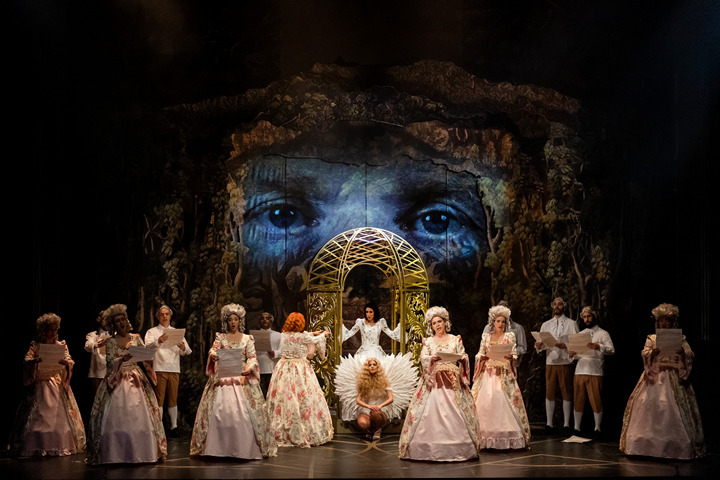| Opera Reviews | 27 July 2024 |
Semele, with a talent to amuseby Catriona Graham |
|
Handel: Semele
|
|

|
|
|
For this year’s staged production, the Göttingen International Handel Festival presents the story of Semele, ‘after the manner of an oratorio’, directed as well as conducted by the Festival’s artistic director, George Petrou. During the overture, we see a group, in white coats, gathered round a bed. A bundle is handed to one, who takes it off-stage, and the sheet is drawn over the body in the bed. They leave, and the body, Semele, sits up. Clearly, it was a nightmare, on the eve of her wedding, for women enter to do her nails and hair and help her dress in a white confection. Welcomed by her father Cadmus (Riccardo Novaro in a sharp, grey morning-suit) in the temple, Marie Lys’ Semele is unimpressed by her intended husband Athamas (Rafal Tomkiewicz), who arrives in grey trousers and rust-red velvet jacket, but is re-dressed (by excitable women) in another sharp, grey morning-suit. Lowering the sartorial tone is Ino, Semele’s sister, in a rather boring ankle-length grey shift dress. It becomes apparent that, unlike Semele, she rather fancies Athamas, for Semele is beautiful, highly photogenic and rather full of herself as a result. After a tremendous storm, an anonymous cleaner comes in to clear up the chaos, and guides her out of the temple. Act 2 opens with Juno (Vivica Genaux typecast as another jealous wife) – black fur coat, dark glasses, killer stiletto sandals - outside a night-club, where clubbers gyrate waiting for the bouncers to let them in. There is an alcoholic in rags beside the dustbins. She plans her revenge on her erring husband with her side-kick / messenger Iris (Marilena Striftombola), dressed as cabin crew complete with wheeled cabin baggage (she has ‘thrice encompass’d sea and land’) to storm the palace new-built for Semele – for the abducting cleaner was Jupiter, enamoured of her beauty; when they leave, the alcoholic rises to his feet and goes through the night-club doors, followed by the bouncers. Meanwhile, in her new-built gilded cage, Semele is suffering insomnia when golden-locked Cupid (Striftombola again) teeters in on vertiginous white stiletto sandals (there is clearly a theme here), showgirly basque and fluffy, feathery wings. Jupiter arrives shortly afterwards, casting off his grotty, grey rags to reveal black trousers and elegant jacket embossed with gold. Without difficulty, he seduces Semele. To distract her from her demands, Jupiter summons her sister, and transforms her surroundings into a landscape so Watteau all it lacks is a swing. And it is Jeremy Ovenden’s big moment, when he sings ‘Where’er you walk’. Ovenden’s Jupiter has aristocratic manners and it is sung beautifully, elegantly, with tasteful, not with ostentatious ornamentation, in short, delightful. Cupid hands out song sheets to the Watteau-dressed chorus. Now Juno interrupts a Hari Krishna Somnus (Novaro in orange robe and ratty grey wig) to embroil him in her plot. She disguises herself as Ino, putting on a fatsuit, the boring grey dress and a red wig, to encourage Semele to hold out for seeing Jupiter as he really is, a god. Which, having demanded the coat and the killer stiletto sandals from Juno, she does, despite his advice to be careful what she wishes for. When he agrees, she lies back and thinks (no doubt) of all the further goodies she can get. Instead, she is destroyed – though why does Jupiter have to roll about the floor in that nice white tux. We are back at the bedside with the white coats, followed by the funeral, leavened first by Ino and Athamas getting together, and then by the arrival of Apollo (Ovenden again), with the bundle from the bedside, which turns out to be Bacchus, in the form of a bottle of bubbly, with which they toast themselves and the happy couple. The singing is superb, especially Genaux and Lys, and the chorus work of the Kammerchor Athen (chorus master Agathangelos Georgakatos) impressive. Paris Mexis’ designs and Stella Kaltsou’s lighting are clever and entertaining. The FestspielOrchester Göttingen is on good form, particularly in the Watteauesque scene, and the use of continuo and solo instruments accompanying the singing is nicely balanced. Some day, directors will notice the direct line from the gods and monsters of 18th century opera to the gods and monsters of 21st century fantasy novels and TV series, and give the full Netflix treatment. Till then, this stylish, slightly camp fashionista version has a talent to amuse. |
|
Photo © Alciro Theodoro da Silva |
|







